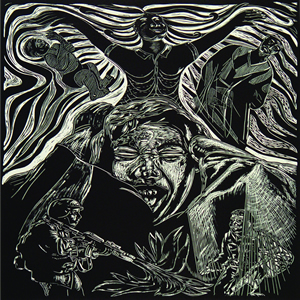Acteal Assassins Released From Prison!
This news just in. Some of you know my long "Coffee" poem on this murder.
What is wrong with the world today is that a few own it.
~ LDC
~~~~~~~~~~~~~~~~~~~~~~~~~~~~~~~~~~~~~~~
Date: Sun, Aug 23, 2009 at 8:49 PM
Subject: Mexico Week In Review: 08.17-08.23
To:
Mexico Week In Review: 08.17-08.23
=================================================================
Published since 1994, 'Mexico Week In Review' is a service of the
Committee of Indigenous Solidarity (CIS). CIS is a Washington, D.C.
based activist group committed to the ongoing struggles of Indigenous
peoples in the Americas. CIS is actively supporting the struggles
of the Indigenous peoples of Mexico while simultaneously combating
related structures of oppression within our own communities.
To view newsletter archives, visit:
http://lists.mutualaid.org/pipermail/mexico-week/
"Para Todos, Todo; Para Nosotros Nada"
=================================================================
ACTEAL UPDATE I: ASSASSINS RELEASED FROM PRISON; WITNESSES THREATENED
In an unprecedented ruling that overturned a lower court on
legalistic rather than constitutional grounds, the Supreme Court
released 20 prisoners serving time for the infamous Acteal massacre
in which paramilitaries gunned down 45 indigenous members of Las
Abejas, a pacifist group, on December 22, 1997. At least 30
additional paramilitary members will be released in coming days as
Justices complete paperwork. In its 4-1 decision, the Supreme Court
ignored eye witness evidence from survivors, focusing instead on
mismanagement of the investigation by the Federal Attorney General
and fabrication of evidence by presiding judges. "This tribunal is
not absolving anyone of guilt," claimed Justice Jose Ramon Cossio.
"We determined that the complainants did not receive due process,
which is not equivalent to a pronouncement of innocence." However,
dozens of paramilitary members, many who confessed to their crimes,
are now free, and some have threatened to return to seek revenge
against survivors of the massacre who testified against them. Human
rights groups universally criticized the decision on three grounds:
confessed assassins were released from prison, eye witnesses are now
in danger, and the intellectual authors of the massacre have never
been brought to justice.
Religious leaders affiliated with both the PRI and PAN organized the
legal defense of the paramilitaries under the Center for Economic
Research and Teaching (CIDE). CIDE is suing the Fray Bartolome Human
Rights Center, community leaders from Mitziton, and Hermann
Bellinghausen, reporter from La Jornada, for defamation of character.
The religious leaders are affiliated with the Eagle's Wings and the
Army of God, evangelical groups who claim as members the
paramilitaries who carried out the Acteal massacre.
Source: Mexico Solidarity Network Weekly News Summary: 08/03-16
====
ACTEAL UPDATE II: AMNESTY SAYS NEW INVESTIGATION IS ESSENTIAL
The Mexican authorities must begin a new independent investigation
into the Acteal massacre in order to ensure that all those
responsible are brought to justice, said Amnesty International. The
statement follows the Mexican Supreme Court's decision to release 20
of those convicted for the Acteal massacre, in Chiapas state, where
45 Tzotzil Indigenous people were killed in 1997. The prisoners were
released on the grounds of irregularities in the collection of
evidence during the investigation and trial.
"This is yet another example of the serious deficiencies of the
Mexican justice system, which seems to be incapable of investigating,
prosecuting and punishing through a fair trial those responsible for
human rights violations," said Rupert Knox, Mexico researcher at
Amnesty International.
According to information obtained by Amnesty International, the
irregularities in the investigation into the Acteal case and into
many others were apparent from the beginning and led to unsound
convictions that could be quashed, leaving the culprits unpunished.
On several occasions, Amnesty International has denounced the
investigation carried out by the Federal Attorney General's Office
(Procuraduría General de la República, PGR) into the Acteal case as
flawed and continues to urge the authorities to conduct an exhaustive
investigation, with all the guarantees necessary to establish the
truth and responsibilities at all levels, including the role of the
senior officials and members of the army suspected of involvement in
the massacre by failing to prevent it or by acquiescing with the
perpetrators.
"It is essential to immediately clarify exactly what happened in
Acteal, to punish those responsible, after a fair trial, and to
provide reparations," said Rupert Knox. "Without justice, the
authorities are condemning the community to the danger of more
violence."
Background Information
On 22 December 1997, in Acteal, Chenalhó municipality, Chiapas State,
the authorities armed members of the illegal armed or paramilitary
groups responsible for the killings and failed to prevent the
massacre despite ample opportunity. The investigation into the Acteal
massacre by the PGR resulted in the conviction of approximately 80
indigenous individuals from neighboring communities directly involved
in the attack. Fourteen junior public officials were convicted and
served sentences of between three and eight years for murder and
wounding by omission or for carrying firearms supposedly for the
exclusive use of the army. However, no senior official or member of
the army has ever been held to account for their suspected
involvement in the case.
Source: Amnesty International Press Release: 08/17
====
What is wrong with the world today is that a few own it.
~ LDC
~~~~~~~~~~~~~~~~~~~~~~~~~~~~~~~~~~~~~~~
Date: Sun, Aug 23, 2009 at 8:49 PM
Subject: Mexico Week In Review: 08.17-08.23
To:
Mexico Week In Review: 08.17-08.23
=================================================================
Published since 1994, 'Mexico Week In Review' is a service of the
Committee of Indigenous Solidarity (CIS). CIS is a Washington, D.C.
based activist group committed to the ongoing struggles of Indigenous
peoples in the Americas. CIS is actively supporting the struggles
of the Indigenous peoples of Mexico while simultaneously combating
related structures of oppression within our own communities.
To view newsletter archives, visit:
http://lists.mutualaid.org/pipermail/mexico-week/
"Para Todos, Todo; Para Nosotros Nada"
=================================================================
ACTEAL UPDATE I: ASSASSINS RELEASED FROM PRISON; WITNESSES THREATENED
In an unprecedented ruling that overturned a lower court on
legalistic rather than constitutional grounds, the Supreme Court
released 20 prisoners serving time for the infamous Acteal massacre
in which paramilitaries gunned down 45 indigenous members of Las
Abejas, a pacifist group, on December 22, 1997. At least 30
additional paramilitary members will be released in coming days as
Justices complete paperwork. In its 4-1 decision, the Supreme Court
ignored eye witness evidence from survivors, focusing instead on
mismanagement of the investigation by the Federal Attorney General
and fabrication of evidence by presiding judges. "This tribunal is
not absolving anyone of guilt," claimed Justice Jose Ramon Cossio.
"We determined that the complainants did not receive due process,
which is not equivalent to a pronouncement of innocence." However,
dozens of paramilitary members, many who confessed to their crimes,
are now free, and some have threatened to return to seek revenge
against survivors of the massacre who testified against them. Human
rights groups universally criticized the decision on three grounds:
confessed assassins were released from prison, eye witnesses are now
in danger, and the intellectual authors of the massacre have never
been brought to justice.
Religious leaders affiliated with both the PRI and PAN organized the
legal defense of the paramilitaries under the Center for Economic
Research and Teaching (CIDE). CIDE is suing the Fray Bartolome Human
Rights Center, community leaders from Mitziton, and Hermann
Bellinghausen, reporter from La Jornada, for defamation of character.
The religious leaders are affiliated with the Eagle's Wings and the
Army of God, evangelical groups who claim as members the
paramilitaries who carried out the Acteal massacre.
Source: Mexico Solidarity Network Weekly News Summary: 08/03-16
====
ACTEAL UPDATE II: AMNESTY SAYS NEW INVESTIGATION IS ESSENTIAL
The Mexican authorities must begin a new independent investigation
into the Acteal massacre in order to ensure that all those
responsible are brought to justice, said Amnesty International. The
statement follows the Mexican Supreme Court's decision to release 20
of those convicted for the Acteal massacre, in Chiapas state, where
45 Tzotzil Indigenous people were killed in 1997. The prisoners were
released on the grounds of irregularities in the collection of
evidence during the investigation and trial.
"This is yet another example of the serious deficiencies of the
Mexican justice system, which seems to be incapable of investigating,
prosecuting and punishing through a fair trial those responsible for
human rights violations," said Rupert Knox, Mexico researcher at
Amnesty International.
According to information obtained by Amnesty International, the
irregularities in the investigation into the Acteal case and into
many others were apparent from the beginning and led to unsound
convictions that could be quashed, leaving the culprits unpunished.
On several occasions, Amnesty International has denounced the
investigation carried out by the Federal Attorney General's Office
(Procuraduría General de la República, PGR) into the Acteal case as
flawed and continues to urge the authorities to conduct an exhaustive
investigation, with all the guarantees necessary to establish the
truth and responsibilities at all levels, including the role of the
senior officials and members of the army suspected of involvement in
the massacre by failing to prevent it or by acquiescing with the
perpetrators.
"It is essential to immediately clarify exactly what happened in
Acteal, to punish those responsible, after a fair trial, and to
provide reparations," said Rupert Knox. "Without justice, the
authorities are condemning the community to the danger of more
violence."
Background Information
On 22 December 1997, in Acteal, Chenalhó municipality, Chiapas State,
the authorities armed members of the illegal armed or paramilitary
groups responsible for the killings and failed to prevent the
massacre despite ample opportunity. The investigation into the Acteal
massacre by the PGR resulted in the conviction of approximately 80
indigenous individuals from neighboring communities directly involved
in the attack. Fourteen junior public officials were convicted and
served sentences of between three and eight years for murder and
wounding by omission or for carrying firearms supposedly for the
exclusive use of the army. However, no senior official or member of
the army has ever been held to account for their suspected
involvement in the case.
Source: Amnesty International Press Release: 08/17
====



